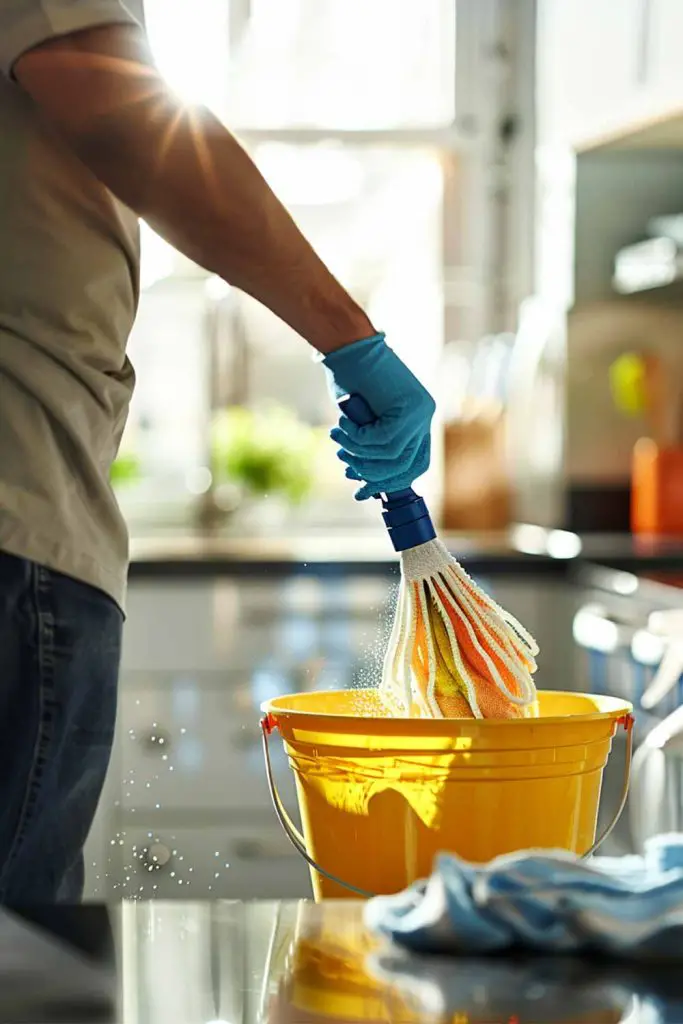9 Cleaning Products You Should Never Mix!

When it comes to maintaining a clean home, the arsenal of cleaning products under your sink might be vast and varied. While each product is effective on its own, mixing them can sometimes lead to dangerous chemical reactions.
Here, we’ll delve into the nine cleaning products you should never mix, why these combinations are hazardous, and safer alternatives for achieving a sparkling clean home.
1. Bleach and Ammonia
Mixing bleach and ammonia is a classic but deadly mistake. This combination produces chloramine vapors, which can cause respiratory issues, watery eyes, and even severe lung damage.
Alternative: Use bleach and ammonia-based cleaners separately, and always ensure proper ventilation when using either product.
2. Bleach and Vinegar
While both bleach and vinegar are powerful disinfectants, their combination is hazardous. Mixing them produces chlorine gas, which can lead to coughing, breathing difficulties, and eye irritation.
Alternative: Use vinegar as a natural cleaner for countertops and windows, and save bleach for tougher jobs like disinfecting surfaces.
3. Bleach and Rubbing Alcohol
Combining bleach with rubbing alcohol creates chloroform, a toxic compound that can cause dizziness, nausea, and even unconsciousness.
Alternative: Use rubbing alcohol as a disinfectant for small surfaces or electronics, and bleach for bathroom and kitchen deep cleaning.
4. Hydrogen Peroxide and Vinegar
When combined, hydrogen peroxide and vinegar form peracetic acid, which can irritate the skin, eyes, and respiratory system.
Alternative: Use hydrogen peroxide to disinfect wounds or as a stain remover, and vinegar for its natural cleaning properties.
5. Drain Cleaners
Mixing different types of drain cleaners, especially those containing acid and those containing a base, can result in a violent reaction and release toxic fumes.
Alternative: Use a plunger or a plumbing snake for tough clogs, and a single type of chemical drain cleaner if necessary.
6. Bleach and Toilet Bowl Cleaner
Mixing bleach with toilet bowl cleaner, which often contains hydrochloric acid, produces toxic chlorine gas, leading to respiratory problems and skin irritation.
Alternative: Use toilet bowl cleaners as directed without adding bleach. For a natural alternative, use baking soda and vinegar.
7. Oven Cleaner and Bleach
Combining oven cleaner with bleach can create chlorine gas, which is extremely harmful to your respiratory system and skin.
Alternative: Use oven cleaner on its own, ensuring proper ventilation, or try a natural approach with baking soda and water paste.
8. Baking Soda and Vinegar
Though often recommended for unclogging drains, mixing baking soda (a base) and vinegar (an acid) neutralizes their cleaning power. The reaction produces water and carbon dioxide, making it less effective for cleaning.
Alternative: Use baking soda and vinegar separately; for instance, use baking soda as a scrubbing agent and vinegar as a deodorizer and mild disinfectant.
9. Lysol and Bleach
Lysol and other disinfectants may contain various chemicals, including alcohol or ammonia, which can react dangerously with bleach, producing toxic gases.
Alternative: Stick to using Lysol for general disinfection and bleach for more intensive cleaning, but never mix the two.
Safety Tips for Using Cleaning Products
- Read Labels Carefully: Always read the instructions and warnings on cleaning product labels. Manufacturers provide important information on how to use the products safely.
- Ventilation is Key: Ensure good ventilation when using cleaning products to avoid inhaling fumes.
- Use Gloves and Protective Gear: Wear gloves and, if necessary, protective eyewear to prevent skin and eye contact with harmful chemicals.
- Store Safely: Keep cleaning products in their original containers and store them out of reach of children and pets.
- Educate Your Household: Make sure everyone in your home understands the dangers of mixing cleaning products and the importance of using them safely.
Keeping your home clean doesn’t have to come with health risks. By being aware of the cleaning products you should never mix and using safer alternatives, you can maintain a healthy, sparkling home.
Always prioritize safety and remember that more isn’t always better when it comes to cleaning agents. Happy cleaning!
 (@love.lydeals)
(@love.lydeals) King Of Bleach
King Of Bleach


